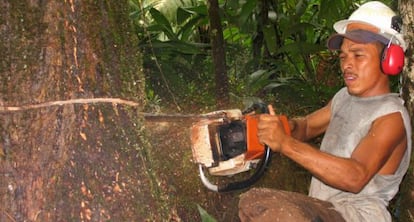Violence and extermination in the lungs of Central America
Indigenous communities say Nicaraguan government has left them at mercy of illegal settlers


Tension is mounting in Bosawás, the largest rainforest reserve in Central America. Leaders of the indigenous ethnic group Mayagna, the traditional inhabitants of an area covering 20,000 square kilometers, have denounced the presence of invaders who clear the land to make way for agricultural and cattle outfits and to exploit the precious woods to be found here. Face-offs between indigenous groups and the invaders, known as colonos (settlers), have already resulted in one indigenous death in late April.
“We don’t want any more deaths; that’s why the institutions must insist on this matter. We Mayagna deserve to live on our territory; we want to resolve this issue peacefully,” said Gustavo Sebastián Lino, president of the Mayagna territory Sauni As, which is located inside the reserve.
In 1997, the UNESCO included Bosawás on its list of World Biosphere Reserves because of its biological importance: more than 270 plant species, over 200 animal species (an estimated 13 percent of all known tropical species live in Bosawás) and around 200,000 insect species are present. It is also the homeland of indigenous people who make a living from the forest’s resources and protect it from invaders. Mayagna leaders said they have organized patrols to report incursions, but that the colonos react violently in an attempt to intimidate them.
“We patrol the vulnerable areas, and tell invaders to leave in a peaceful manner. We do it because we are concerned about the situation of the reserve,” says Sebastián Lino. On April 23, a group of indigenous inhabitants went out to check reports of a new forest invasion. The colonos, they say, razed 28 hectares of tropical forest and attacked them when they tried to gather information to file a complaint. Patrol member Elías Charles Taylor was seriously wounded and died a few days later.
We patrol and tell invaders to leave in a peaceful manner"
Lino has reported a lack of action by the government of Daniel Ortega despite formal orders to the environment ministry, the army and the police to constantly patrol Bosawás. But the president’s instructions are not being followed, says the indigenous leader.
“Ortega told them to come down to settle these issues, but so far they haven’t showed up. That is why we sent patrols over,” explains Lino.
The executive has said that protecting Bosawás will be a priority. Rosario Murillo, the first lady and the de facto head of Ortega’s cabinet, has stated in public that “the president of the Republic will guarantee our focus on a different education, in this case to save Bosawás out of a sense of culture, of affection, of feelings, of life experiences, of identity, of a sense of belonging to the human community that inhabits Mother Earth and which recognizes in Mother Earth, in Mother Nature, a living being, a being that nurtures us, a being that helps us stay alive.”
Murillo made no references to the violence inflicted on indigenous people or to the wood-trading mafias that are ravaging Bosawás, according to reports by environmental groups.
A study by the German Agency for Sustainable Development (GIZ) shows that between 1987 and 2010, Bosawás (which is almost the size of Israel) has lost over 564,000 hectares of rainforest, at an annual average rate of over 42,000 hectares cleared since 2005. This research work, conducted in partnership with the National Union of Farmers and Livestock Breeders of Nicaragua (UNAG), shows that forest deterioration is caused by land speculation, illegal clearing, intensive crop cultivation and livestock breeding, demand for raw materials from emerging economies in Asia, and a lack of action by the government, which scarcely has any presence in the area.
If the government does not act, in 10 years there will be nothing left to protect”
The report is categorical in its warning about the risks to the reserve, which represents 14 percent of Nicaragua’s surface area, and notes that the 3,379 square kilometers of lost virgin land represents an extension far larger than Luxembourg.
Bosawás is under threat from the rise of agriculture, livestock raising and the exploitation of precious woods, industries that bring in over 140,000 dollars to state coffers, although recently the bulk of the money comes from forest exploitation. An estimated 2,000 lumberjacks work in Bosawás, logging precious woods worth around 20 million dollars. The timber trade, which is approved of by local ranchers and even indigenous communities that live in extreme poverty, generates around 118 million dollars, or 2.5 percent of the country’s GDP, according to the Nicaragua Central Bank.
“Forty percent of the wood circulating in the country is illegal,” says Marcial López, author of the study, which is the most comprehensive one to date. “The illegal clearing is a result of an activity that includes many actors: there is a vast network of private investors, importers and informers,” López explains.
The indigenous groups add that they are protecting “the heritage of all Nicaraguans and all the inhabitants of the planet.”
“If the government of Nicaragua does not act, in 10 years there will be nothing left to protect,” wrote indigenous leaders in a public letter. “We want the world to know that Bosawás is in danger.”
Tu suscripción se está usando en otro dispositivo
¿Quieres añadir otro usuario a tu suscripción?
Si continúas leyendo en este dispositivo, no se podrá leer en el otro.
FlechaTu suscripción se está usando en otro dispositivo y solo puedes acceder a EL PAÍS desde un dispositivo a la vez.
Si quieres compartir tu cuenta, cambia tu suscripción a la modalidad Premium, así podrás añadir otro usuario. Cada uno accederá con su propia cuenta de email, lo que os permitirá personalizar vuestra experiencia en EL PAÍS.
¿Tienes una suscripción de empresa? Accede aquí para contratar más cuentas.
En el caso de no saber quién está usando tu cuenta, te recomendamos cambiar tu contraseña aquí.
Si decides continuar compartiendo tu cuenta, este mensaje se mostrará en tu dispositivo y en el de la otra persona que está usando tu cuenta de forma indefinida, afectando a tu experiencia de lectura. Puedes consultar aquí los términos y condiciones de la suscripción digital.








































